The story of Polymarket reveals a capital-driven compliance path.
Written by: Gui Ruofei
Traditional polling agencies in the United States never expected that their replacement would not be advanced artificial intelligence, but rather a Web3 prediction platform. In the 2024 election, numerous polling agencies' survey data indicated that Harris had a clear advantage over Trump in terms of support. However, the prediction results from the Polymarket platform were vastly different, showing that Trump's probability of winning was consistently ahead of Harris. Ultimately, as Trump decisively defeated Harris to win the 2024 presidential election, Polymarket gained fame and began to enter the public eye.
However, behind Polymarket's rapid development, compliance issues and regulatory pressures have always loomed large, becoming the biggest obstacle to its further expansion. In the face of aggressive regulatory bodies from various countries, Polymarket has carved out a unique compliance path. This article will provide an in-depth analysis of Polymarket's regulatory status, compliance risks, and compliance path from the professional perspective of the Web3 industry and multinational compliance, serving as a reference for future Web3 entrepreneurs and project teams.
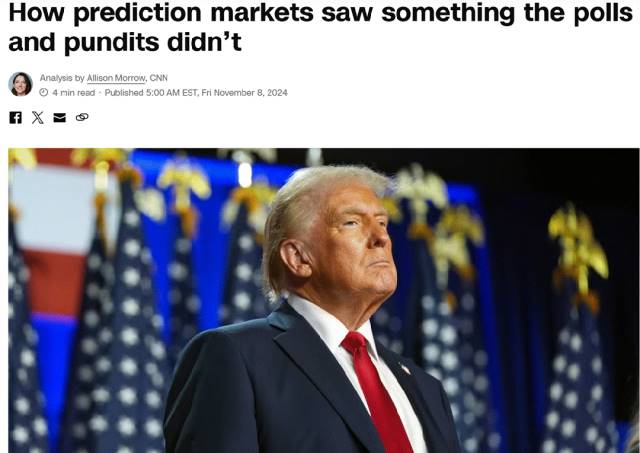
CNN officially writes about the Polymarket prediction market that shone in the U.S. election.
### 1. What exactly is Polymarket?
As an emerging Web3 prediction market platform, Polymarket has quickly established itself as a leader in the prediction market since its establishment in 2020, thanks to its transparency and decentralization based on blockchain technology. Polymarket's prediction market covers a wide range of areas, spanning political events, capital markets, economic indicators, sports events, and even social and cultural events. The broad scope of predictable events is key to attracting a large number of users, but it also increases the complexity of its classification and regulation in different jurisdictions. Users primarily predict events on Polymarket by purchasing tokens for specific outcomes, with token prices fluctuating between $0 and $1. Therefore, the prices of Polymarket's event tokens reflect the collective perception of the likelihood of that specific outcome occurring in real-time.
Polymarket's core value proposition lies in transforming abstract predictive opinions into priceable, tradable digital assets through blockchain technology, allowing users to benefit from it. For example, during the 2024 election, the price of the token for betting on "Trump winning" rose from an initial $0.3 to $0.92, ultimately cashing out at $1 when the election results were announced. This price change accurately captured the real shift in public opinion during the election and created significant wealth effects for users who successfully predicted the outcome.
Polymarket's rapid rise in the Web3 prediction market has also attracted the attention of the capital market. To date, Polymarket has successfully completed two rounds of financing, raising over $70 million. Its investors include notable figures such as Ethereum co-founder Vitalik Buterin and Founders Fund, led by Peter Thiel.
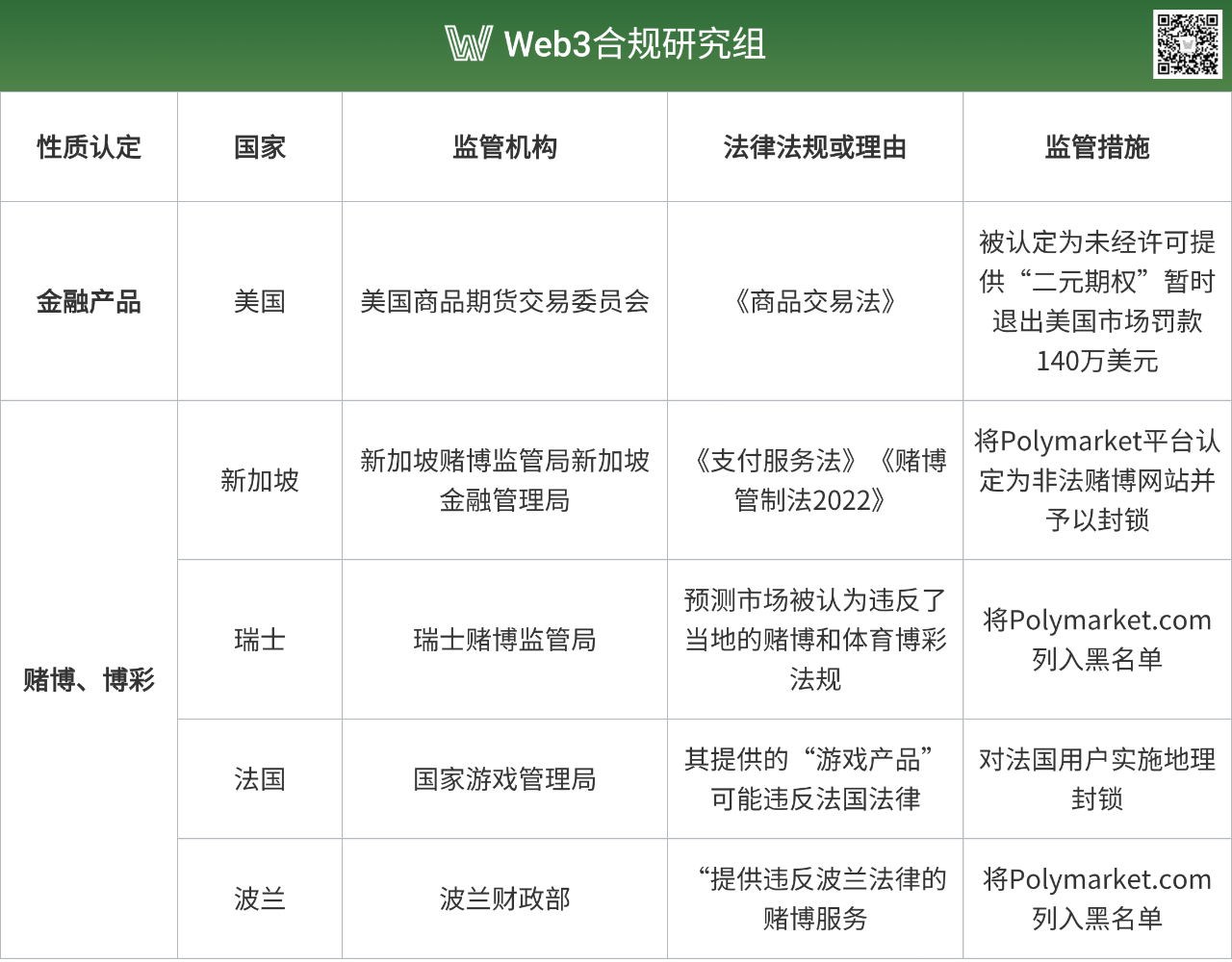
### 2. A Brief Analysis of Polymarket's Global Regulatory Dilemma
1. United States: Classified as Binary Options, Ultimately Settled with CFTC
In the U.S. market, Polymarket's initial compliance dilemma stemmed from the strict enforcement actions of the Commodity Futures Trading Commission (CFTC). In January 2022, the CFTC imposed a civil penalty of $1.4 million on Polymarket and issued a cease and desist order. According to the relevant provisions of the Commodity Exchange Act, the CFTC deemed that the "event contracts" offered in Polymarket's prediction market fell under its jurisdiction. The Commodity Exchange Act explicitly states that the CFTC has the authority to regulate "futures, options, and swap markets."
Therefore, when the prediction market allows users to bet on events such as election results and economic indicators, the CFTC tends to classify the product as a binary option or swap contract, thus bringing it under its exclusive jurisdiction over derivative markets. In other words, the CFTC believes that the nature of the "event contracts" provided by Polymarket falls within the category of financial derivatives under its jurisdiction, rather than gambling or betting activities. Consequently, the core of the CFTC's accusation is that Polymarket operated an unregistered derivative trading platform that failed to register as a Swap Execution Facility or Designated Contract Market as required by the Commodity Exchange Act.
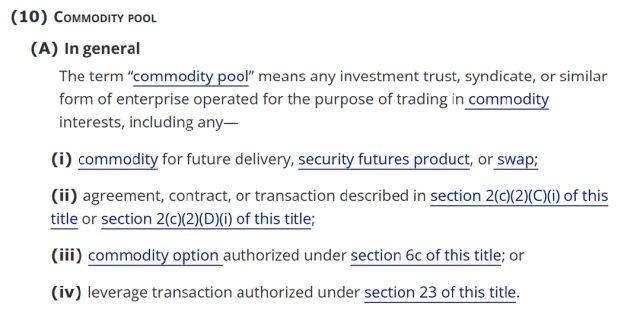
The image above shows the definition of Commodity Pool in Commodity Exchange Act Section 1a(10).
In addition, the prediction market where Polymarket operates also faces a "tug-of-war" between federal and state regulatory agencies. The CFTC attempts to exercise exclusive jurisdiction over the prediction market through the Commodity Exchange Act, viewing it as "event contracts." However, some state gambling regulatory agencies in the U.S. regard prediction markets as "illegal gambling" and have filed lawsuits accordingly. For example, on March 27, 2025, the New Jersey Division of Gaming Enforcement issued a cease and desist order to Kalshi, a direct competitor of Polymarket, prohibiting it from offering sports betting services without a license.
As a result, Kalshi has engaged in a protracted legal battle with gambling regulators in New Jersey and other states. Although U.S. District Court Judge Edward Kiel ruled that the sports event contracts offered by Kalshi fall under the exclusive regulatory jurisdiction of the CFTC, ordering New Jersey regulators to cease interfering with Kalshi's normal operations, this dispute remains unresolved. This jurisdictional conflict between federal and state authorities further exacerbates the uncertainty of the regulatory environment for prediction markets in the U.S.
Thus, for platforms like Polymarket, even if they obtain federal-level approval, they may still face legal challenges and litigation risks from state-level authorities. This coexistence of "dual regulation" and "regulatory vacuum" not only increases the compliance costs for the platform but also hinders its comprehensive expansion in the U.S. market.
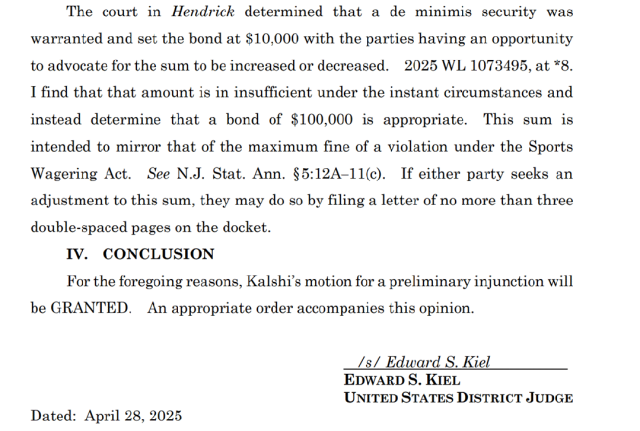
The image above shows the original text of Judge Edward Kiel's ruling allowing Kalshi to file a preliminary injunction against the gambling enforcement agency.
2. Europe: Classified as Gambling, Blacklisted
However, Polymarket's compliance challenges are not limited to the United States. In other jurisdictions around the world, Polymarket also faces severe regulatory pressure. In the European Union, the implementation of the Markets in Crypto-Assets Regulation (MiCA) establishes a unified regulatory framework for crypto asset service providers (CASPs) and covers asset-referenced tokens (ARTs), electronic money tokens (EMTs), and other crypto assets not covered by existing financial services legislation. However, the MiCA regulation does not explicitly include prediction markets within its regulatory scope, leaving room for countries to independently regulate based on their gambling laws. Therefore, even though the MiCA regulation provides a unified authorization framework for crypto assets in the EU, prediction market platforms still face fragmented regulation from European countries.
In Europe, from November 2024 to January 2025, multiple countries' regulatory agencies have successively taken regulatory measures against Polymarket. The Swiss Gambling Regulatory Authority blacklisted Polymarket.com on November 26, 2024, citing that its prediction market was deemed to violate local gambling and sports betting regulations. The French National Gaming Authority announced on November 29, 2024, that after an investigation, Polymarket agreed to implement geographic restrictions for French users, as its "gaming products" might violate French law.
Reports indicate that this action by French regulators partly stemmed from regulatory concerns raised after French traders made substantial bets on the U.S. election on the Polymarket platform. Subsequently, the Polish Ministry of Finance also blocked access to Polymarket.com for its residents on January 8, 2025, citing "providing gambling services in violation of Polish law."
This indicates that European countries generally adopt a conservative and cautious regulatory attitude towards prediction markets led by Polymarket, with most regulatory agencies viewing prediction markets as gambling activities and strictly regulating and restricting them based on their respective gambling laws.
3. Singapore: Violating Two Acts
Singapore's regulatory framework for prediction markets combines the Payment Services Act and the Gambling Control Act 2022, targeting Polymarket from different angles. First, the Monetary Authority of Singapore strictly licenses and regulates digital payment token service providers under the Payment Services Act. The Monetary Authority of Singapore believes that Polymarket operates digital payment token services without a license and emphasizes the serious anti-money laundering/anti-terrorist financing (AML/CFT) risks it poses, along with the lack of investor protection mechanisms and user dispute resolution mechanisms.
At the same time, the Singapore Gambling Regulatory Authority also classified the Polymarket platform as an illegal gambling website and blocked it under the Gambling Control Act 2022. The Gambling Control Act 2022 clearly states that only nationally licensed platforms (such as Singapore Pools) are allowed to provide online gambling services in Singapore. Therefore, Polymarket faces dual compliance challenges in Singapore, needing to comply with the licensing and regulatory requirements for digital payment token services under the Payment Services Act while also avoiding the strict entry restrictions set by the Gambling Control Act 2022.
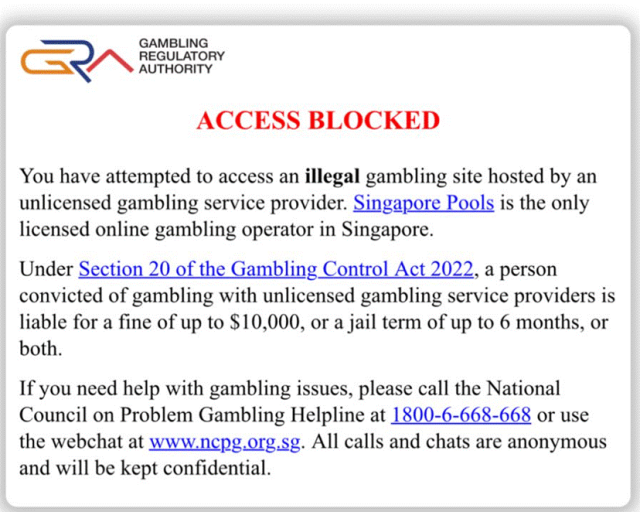
The image above shows the announcement issued by the Singapore Gambling Regulatory Authority after blocking Polymarket.
From the regulatory comparison of the aforementioned jurisdictions, it is clear that global regulatory agencies exhibit a significant dichotomy between "financialization" and "gambling" in their oversight of prediction markets. For example, the CFTC in the United States tends to view prediction markets as "event contracts" under the Commodity Exchange Act (CEA), attempting to bring them under the regulatory framework for options, swaps, and other financial derivatives. This classification acknowledges the potential value of prediction markets in information discovery and risk hedging but also requires them to bear the strict regulatory responsibilities of financial markets, including CFTC registration, KYC/AML compliance, and reporting suspicious transactions.
However, in some European countries (such as Switzerland, France, and Poland) and Singapore, regulatory agencies explicitly classify platforms like Polymarket as "illegal gambling" and have taken blocking measures. This reflects a greater focus in these countries on controlling the speculative nature, potential social harm, and moral risks associated with prediction markets, thereby placing them under typically stricter gambling regulations and consumer protection frameworks.
The challenge faced by Polymarket is that it must adopt customized compliance strategies tailored to the different requirements of various jurisdictions in a global environment lacking unified regulatory standards, which undoubtedly increases its operational complexity and compliance costs. This difference in the classification of prediction market nature is not coincidental; it reflects the delicate balance that regulatory agencies in different countries maintain between financial innovation, consumer protection, and public morality.
### 3. Surviving in the Cracks: How Does Polymarket Address Compliance Challenges?
1. United States: Proactive Compliance and Return through Acquisition
In the face of the aggressive CFTC, Polymarket showed sincerity during the investigation process, demonstrating a positive attitude of "substantive cooperation." This good attitude and proactive communication helped Polymarket secure a relatively low fine. In January 2022, Polymarket officially signed a settlement agreement with the CFTC, acknowledging that some of its trading activities fell under the CFTC's regulatory scope as binary options trading and agreeing to pay a fine of approximately $1.4 million.
As one of the key terms of the settlement agreement, Polymarket committed to ceasing platform services to U.S. users starting in 2022 and implemented geographic restrictions on U.S. IP addresses. Subsequently, Polymarket shifted its core prediction business offshore to operate, thereby avoiding regulatory restrictions and compliance risks within the U.S. Notably, even though Polymarket claimed to have implemented geographic restrictions for U.S. users, reports indicated that some U.S. users continued to participate in platform trading by circumventing these restrictions through VPNs and other technical means. This phenomenon reflects both the limitations of IP address-based geographic blocking technology and the solid user base of prediction markets.
To better adapt to the U.S. regulatory environment and prepare for a return to the U.S. market, Polymarket appointed former CFTC Commissioner J. Christopher Giancarlo as the chairman of its advisory board in May 2022. Reports indicated that this move aimed to leverage Giancarlo's deep understanding of the CFTC's operational model and regulatory logic to help Polymarket better plan its compliance path and establish effective communication channels with regulatory agencies. This approach of "hiring former regulatory staff for compliance consulting services" is quite common among companies in the pharmaceutical, financial, and other sectors in the U.S.
However, in November 2024, Polymarket's compliance issues resurfaced. The FBI conducted a raid on Polymarket CEO Shayne Coplan's residence in New York, seizing his phone and other electronic devices, but did not arrest him. The primary purpose of the FBI's action was to investigate whether Polymarket had violated the previous settlement agreement with the CFTC, as Polymarket was suspected of failing to prevent U.S. users from continuing to trade on the platform through VPNs and other means.
Recently, with the rise of the Trump administration and a crypto-friendly regulatory direction, Polymarket's compliance outlook in the U.S. has seen a significant turnaround. On July 15, 2025, official reports confirmed that the U.S. Department of Justice (DOJ) and the CFTC had officially concluded their investigation into Polymarket and had not filed any new charges. This development marks a resolution of the legal accusations and regulatory uncertainties Polymarket faced since the CFTC's penalties in 2022 and the FBI's enforcement actions against Shayne Coplan in 2024.
Following this, on July 21, 2025, Polymarket officially announced the acquisition of QCEX, a derivatives exchange and clearinghouse that had obtained CFTC approval, for $112 million. This strategic acquisition was hailed by Polymarket founder and CEO Shayne Coplan as a symbolic move to "bring Polymarket home," aimed at providing a "fully regulated and compliant framework" for Polymarket's operations in the U.S. Coincidentally, QCEX officially received its Designated Contract Market (DCM) license from the CFTC on July 9, 2025, and Polymarket completed the acquisition of QCEX just 12 days later. With QCEX's existing DCM license, Polymarket can finally reopen to U.S. users legally and temporarily alleviate compliance risks.
On the surface, it seems that Polymarket has resolved its compliance issues and returned to the U.S. market merely by acquiring QCEX, which holds a DCM license. However, in reality, the changes and compromises Polymarket has made for compliance go far beyond this. Among them, Polymarket's shift in attitude towards KYC/AML is a key aspect of its compliance transformation. Polymarket's early characteristics included "anonymity" without KYC and "decentralization" in trading. Leveraging these features, Polymarket quickly established a foothold and continued to expand in the competitive prediction market. However, this operational strategy brought "regulatory uncertainty" and "market manipulation" risks to the platform. As Polymarket returned to the U.S. through the acquisition of QCEX, it is likely to adopt QCEX's strict KYC/AML policies required for CFTC-licensed entities.
Specifically, entities licensed under CFTC regulation need to implement Customer Identification Programs (CIP), Customer Due Diligence (CDD), and Enhanced Due Diligence (EDD), along with ongoing transaction monitoring and reporting of suspicious activities. This also signifies that Polymarket needs to continuously balance between decentralization and regulatory compliance. This transformation for Polymarket is not only to meet regulatory requirements but also an inevitable result of its transition from a "wild growth" model in Web3 to a regulated financial service institution.
2. Other Countries and Regions: Conservative Strategy + Proactive Withdrawal
Compared to the United States, Polymarket's compliance strategies in other countries and regions are relatively conservative. In the face of the classification of prediction markets as "gambling" and prohibitive requirements in Europe and Singapore, Polymarket did not raise objections but agreed to implement geographic restrictions in countries like France and Singapore, effectively withdrawing from those local markets.
### 4. Important Insights for Web3 Entrepreneurs
After a detailed analysis of Polymarket's challenging compliance path, the author believes that other Web3 entrepreneurs should at least learn the following key insights:
The Web3 industry has gradually moved away from the "wild growth" phase, with more projects entering the public eye and mainstream markets. For Web3 projects to truly grow and strengthen, compliance operations are an inevitable trend.
Whether Web3 projects can truly achieve compliance depends not only on the companies' compliance strategies but also closely relates to national policy directions and regulatory intensity. Polymarket's eventual achievement of compliant operations owes much to the rise of the Trump administration and the shift in policies.
The story of Polymarket reveals a "capital-driven compliance" path. In the early stages of platform operation, the project team prioritized scaling up the project to gain economies of scale and first-mover advantages, postponing compliance. The project team then leveraged the advantages accumulated in the early stages to secure financing, actively pursuing compliance transformation through acquisitions and other means using capital leverage, thereby legalizing its business and facilitating further expansion. This is not only a compliance strategy but also a business strategy.
The global regulatory arbitrage window for the Web3 industry is rapidly narrowing, and the compliance costs for the entire Web3 industry are continuously rising. As the crypto market matures, global regulatory agencies are strengthening cooperation and closing regulatory loopholes, making it increasingly difficult to evade compliance through "regulatory arbitrage" or "offshore operations." Polymarket's approach of "growing large before complying" may no longer be applicable in the new regulatory environment. Web3 project teams and entrepreneurs need to have a deeper understanding and recognition of the importance of compliance. The future competition in the Web3 industry will not only be limited to technology and products but also a contest of compliance capabilities and capital strength.
免责声明:本文章仅代表作者个人观点,不代表本平台的立场和观点。本文章仅供信息分享,不构成对任何人的任何投资建议。用户与作者之间的任何争议,与本平台无关。如网页中刊载的文章或图片涉及侵权,请提供相关的权利证明和身份证明发送邮件到support@aicoin.com,本平台相关工作人员将会进行核查。



